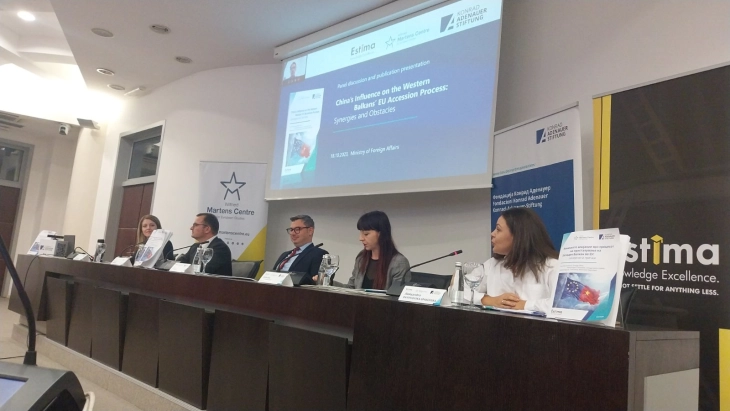Krstinovska: Western Balkans' stagnation on EU path has increased Chinese influence
- Western Balkans' stagnation on the EU path has increased Chinese influence in the region, and this influence is most prominent in trade relations, said Ana Krstinovska, one of the authors of a publication entitled "China's Influence on the Western Balkans' EU Accession Process: Synergies and Obstacles".

Skopje, 18 October 2023 (MIA) - Western Balkans' stagnation on the EU path has increased Chinese influence in the region, and this influence is most prominent in trade relations, said Ana Krstinovska, one of the authors of a publication entitled "China's Influence on the Western Balkans' EU Accession Process: Synergies and Obstacles".
Krstinovska, who is president of the Association for Development of Strategies, Research, Education and Promotion of International Values (ESTIMA), told MIA on Wednesday that in general, Chinese influence in the region has been increasing in the past decade as a result of the established cooperation between China and Central and Eastern Europe, and the Western Balkans' stagnation on the EU path has opened additional opportunities for China to increase its influence, whether it is in terms of business presence or another type of influence.
"We mainly see the increase in influence in the economy through increased trade, i.e. imports from China have increased, while our exports have increased only a little, but it is not in line with our expectations as to how much we can import considering the size of China's market," Krstinovska said.
She added that when it comes to investments, North Macedonia remains a country that is very little attractive to China, with Serbia being most attractive.

As to whether the influence will also be reflected in the country's EU process, Krstinovska noted that it depends only on us and the implementation of reforms which, among other things, also means limiting the space for external influence.
"An important thing on the path to EU is how we position ourselves and how willing we are to implement reforms. Chinese presence in the country can be positive as long as we use is as such, and it can be negative if we allow public procurement that is neither in line with our legislation nor European regulation. We are implementing membership reforms and part of those reforms will help limit the space for Chinese companies to operate, or to making deals behind closed doors as has often been the case in recent years, but China itself or Chinese presence cannot be said to be a major obstacle," Krstinovska said.
Official representative of Konrad Adenauer Foundation Office in Skopje, Daniel Braun, said that trade, i.e.economic relations with other countries are never bad, but it is very important to focus on the EU's goals, which are different from China's.

"China and EU have different goals, which doesn't mean that we cannot use Chinese technology, but if there are security uncertainties then we should ask ourselves if we should use it. We do not have to cut ties with China, but understand that these are two sides with different prices, no one is saying not to learn Chinese, but to be aware of the consequences of our actions," Braun noted.
The goal of the publication is to encourage discussion about areas where Chinese influence is present and possible consequences in the future.
"It is important to contribute to opening a forum, a debate on China's influence, its presence in the region, and determine its positive or negative influence, the spheres it infiltrates, and the impact that influence has in undermining EU's authority in the region, to what extent Chinese influence can be harmful to the Euro-Atlantic process that concerns all countries in the region, and what those countries and the EU can do to counter or respond to its influence," said Katerina Jakimovska from the Wilfried Martens Centre for European Studies in Brussels.
She noted that panel conclusions, in general, are that both regarding Russian and non-European influence, if the European integration process continues to stagnate, it is logical to expect an increased presence of other non-European actors in the Western Balkans. ssh/nn/
Photo: MIA/MIA archive







